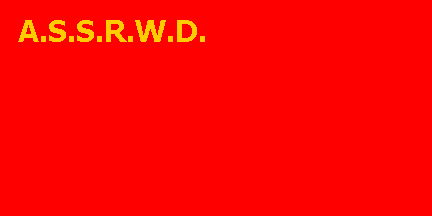
Last modified: 2007-06-09 by antónio martins
Keywords: volga german assr | assr der wolga deutschen |
Links: FOTW homepage |
search |
disclaimer and copyright |
write us |
mirrors

The Volga German ASSR existed 1924-1941: Established as Labour Commune
of Volga Germans or Volga German AO within Russian
SFSR on 19 october 1918. Transformed into Volga German ASSR on 19
december 1924. Abolished on 28 august 1941.
Mark Sensen, 11 Nov 1996
The official state name was: Autonome Sozialistische
Sowjet-Republik der Wolga-Deutschen (in
English: Autonomous Socialist Soviet Republic of the Volga-Germans);
abbreviation: «A.S.S.R.W.D.». In Russian: Avtonomnaâ
Sovetskaâ Socialistiĉeskaâ Respublika Nemcëv
Povolẑhâ |
Автономная
Советская
Социалистическая
Республика
Немцёв
Поволжья
Jens Pattke, 23 Jun 2001
The city of Engels is the former capital
of Volga-German Republic.
Victor Lomantsov, 07 Oct 2000
The first Germans settled the region starting in 1763 at the invitation of Catharine the Great. Three webpages with summary histories of the Volga germans are:
Some informations, I found in: Rudolf A. Mark Die Völker der ehemaligen Sowjetunion, 1992:
2,039 million Germans were living in former Soviet Union in 1992. Half of them are living in Kasachstan. The rest is scattered around in all the other states of the former Union. Nearly all are the descendants of settlers from Hesse, Palatinate, northern Bavaria and the Rhineland, which moved into the Russian Empire in the second half of the 18th century. The first big treks followed the call of Katharina II of Russia in 1762 and 1763. They arrived at the Volga in the area of Saratow in the same decade. In the following decades, other settlers from Danzig and West Prussia entered into the areas between Dnjeper river, the southern part of Bug river and the coast of the Black Sea. Germans from Württemberg, Alsace and other regions followed. Other German settlements were founded after Russian conquer in Northern Kaukasus. More in Bessarabia (Moldova) after 1812 between Dnjestr and Pruth.
The Area of the Germans at the Volga were declared to a German workers community in Okt.1918 after revolution, in Feb.1924 it got the status of an ASSR (autonom socialistic soviet republic) of the Volga Germans with the capital of Engels (1929: 27.152 km²). The ASSR had 600 000 inhabitants in 1939, 2/3 were Germans. Further, there were 16 national counties evrywhere in the USSR, 8 of them in the Ukraine. All were eliminated in 1939.
After 1941 and the German attack to USSR, 1 million of 1,5 million Germans in USSR were deported to Western Sibiria, Kasachstan, Kigisia, Tadshikistan and the Altai area. 300 000 of them died and 100 000 were sent into the working army (Trudarmija) till 1947. The Germans in the occupied areas were called to police like organizations, some were settled in the Wartheland. When Red Army striked back, many Volksdeutsche moved in direction of Germany in big and small treks. They were gathering most time outside of the borders of the German Reich and were deported to Sibiria and central Asia by red army in 1945. The deported Germans were kept in working camps till 1950, and were not allowed to move back to their old settlments.
Germans got full civil rights back in Nov 1972. In 1991 Germans got special national rights in the Altai area (German Rajon) at the city Halbstadt. Some Germans are resettled in Ukraine near Odessa, Cherson, Nikolajew and Saporoschje. Many hundred thousands Germans came back to the Federal Republic of Germany since the 1970ies.
J. Patrick Fischer, 28 Feb 2002

First known flag of the republic was adopted in 1926, red flag with
golden letters (abbreviation of the name of state) in german.
Victor Lomantsov, 07 Oct 2000
The first flag was adopted togheter the decree of fundation
of the republic 19 December 1924 and was red with inscription.
This flag was in use until adoption of new
constitution 29 April 1937. (Source:
personal communication from Lucien
Philippe; his source was personal communication from
Ottfried Neubecker, 1973).
Jaume Ollé, 03 Jul 2003

Adopted in 1937 (or in 1938), red with insciptions in Russian
and in German: "RSFSR. ASSR of Volga-germans".
Victor Lomantsov, 07 Oct 2000
[Flag version with German text above Russian text.]
According a document in the public library Pompidou in Paris [*], new flag
was adopted in 29 April 1937. William Crampton
obtained the exact design and comunicate it to
Philippe in August 1974. Was in use at least
until 1938. The flag in real use was slighty changed in
next months changing order of the inscriptions (russian first). (Source:
personal communication from Lucien Philippe.)
Jaume Ollé, 03 Jul 2003
(* Bibliothéque Publique d’Information, located in the
Centre National d’Art et Culture Georges-Pompidou, in Paris.)
Ivan Sache, 04 Jul 2003
Oleg Tarnowski communicated that the modified version
dated 1939, in use until 28 August 1941 (personal communication from
Lucien Philippe).
Jaume Ollé, 03 Jul 2003
No. I do not think, that it is the real information. In the State Historical
Archive of Volga Germans in the Engels-city (where I live), in documents of
the Supreme Council and of the Council of People’s Commissioners of
the Volga Germans ASSR and in newspapers of ASSRdWD of 1937-1941 there is no
document on change of a flag of 1937 of ASSRdWD. Absolutely authentically.
Mikhail Revnivtsev, 25 Oct 2006
On flags of autonomous republics (ASSR) in structure of the
RSFSR there could not be inscriptions on the
national languages located above of inscriptions
in Russian language. Absolutely authentically.
Mikhail Revnivtsev, 25 Oct 2006
Anything below this line was not added by the editor of this page.